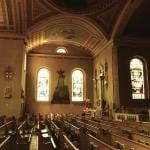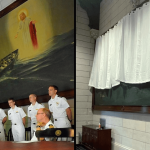This isn’t really an assigned text for this morning, but Peter, in his letter, quotes it, and so rather than climbing back and forth over the True Vine, and the discouraging kind of dependence it indicates, I thought I might just take a glance at Psalm 34, which begins with the note, “Of David, when he changed his behavior before Abimelech, so that he drove him out, and he went away.” That was that clever little time where David pretended to be mad and Achish, wondering why on earth David had been brought to him, asked the important and always relevant question, “Do I lack madmen?” which I think is my life verse right now. But David wasn’t mad, though a lot of people would have thought he was, especially looking at the circumstances of his life, to find him singing the Psalm recorded here.
He begins with praise—“I will always give thanks unto the Lord; his praise shall ever be in my mouth.” Which just shows you how different David was from, say, me, who does not ever begin with praise, nor end with it either. Giving thanks is hard, when you are hard-pressed, as David was. He was really in danger from Saul. Not the sort of pseudo danger of calculating the odds before you get in a car and drive down the highway, or spend an extra 15 minutes breathing in other people’s covid-air. Could be dangerous, could be fine, not really sure. No, running from Saul and his organized army was perilous, though not as risky as hanging around and being pinned to the wall with a spear.
“I sought the Lord, and he heard me,” says David, “he delivered me out of all my fears.” Seems simple enough. But again, it looks rather foolish. When everything is going badly, why would you pause and “seek the Lord,” whom you cannot see, and who never seems to perform the sort of spectacular rescue that you feel you need. It shows a contemptible kind of need, an admission that there isn’t really anything you can do to make everything ok. Like watching the world shut down over covid when you know the suffering will be exponentially increased through such a shutdown. Or watching the death count mount. Or watching somebody essential die. Or just being overwhelmed with fear. You stand there, stuck, anxious, unhappy, and then, after all, you “seek the Lord,” and he “hears” you. That’s not a scare quote, that’s an actual quote. He answers you. He delivers you, though very few people will observe your deliverance.
The people who did this, says David, “They looked unto him, and were made glad, and their faces were not ashamed.” Because really, fear is the breeding ground of shame. I feel like I read that somewhere. Shame is so useful. You can get people to do things for shame. You can use fear and shame to make people go in certain directions, to behave in certain ways. It works so well with children, especially. You can see them shrink into themselves under a sharp, comprehensive rebuke. But God doesn’t use shame as the way to get you to be good. He hears you, he makes you glad, and he gives you the strength to lift up your face without shame and look out the sky, and look at other people.
“Oh taste and see,” says David, “how gracious the Lord is; blessed is the one who trusts in him.” You can’t really know how good God is from a far off, peering through the window at the dinner going on inside. You have to go through the door and sit down with all the other people, and have a bite of everything to see how good it is. Your mind will take a you a reasonable way, of course. In all your seeking, you have to try to understand, to discover what sort of God is able to bless you, to lift the pall of shame, to make you glad. But then you should go ahead and have a chair and a taste.
Trouble is, most of us fear that if we really taste what God is holding out, we will discover that he is not good. Trusting him is dangerous. What if you put your whole self in his hands and something bad happens? Which it will. Bad things always happen, no matter how hard you try to avoid them. You’ll be alienated from someone and cast down into a peculiar kind of comprehensive pain from which there is no obvious escape. You’ll get sick and there won’t be anything you can do about it. You’ll discover that you don’t have the abilities you thought you did, and certain failure is looming over you, waiting to strike you down. You’ll discover that you don’t have enough money to have or do what you know you need to cope and be happy. Bad things will happen and do happen. You “tasted,” you trusted, and the ash flavor in your mouth is sickening.
Was that because God isn’t good? Is the thing that he’s given you really evil? David carries on for several verses, noting, rightly, that refraining from evil, that seeking peace, that doing good will save you a lot of heartbreak, that God always hears the prayers of the “righteous” among which he is counted, though he sinned greatly. Then he says, and this is the secret,
The righteous cry, and the Lord hears them and delivers them out of all their troubles.
The Lord is near to those who are brokenhearted and will save those who are crushed in spirit.
Great are the troubles of the righteous, but the Lord delivers him out of them all.
He keeps all his bones, so that not one of them is broken.
So then, in the merest breath, you can see that David is apprehending someone else, has caught a glimpse of the key that unlocks the totality of all your troubles, though you suffer through them for yet a little while. Whatever it is that you taste, though it is good, it is not the good you expected. No, indeed, for troubles continue to multiply. They are “great,” the righteous one is “crushed in spirit,” and “brokenhearted.” No one looking at the kind of pathetic grief you wake up and face—whether it is big or little, easily pushed aside or crowding into your vision so that you can’t get through the day without crying—would imagine that you had tasted anything good, that the Lord whom you sought had done anything for you.
Yet he has. See, “not one of his bones was broken.” His shamed, broken, crushed form, hanging there when you know it should have been you, because your fear had been real, your sin wasn’t imagined, your inadequacies were the truth, your grief was insurmountable. He knew it, and when you sought him, it was because he had already gone into the uttermost parts of the sea to seek you, to find you when you were hiding, to bring you to his table. When you would not have been admitted because of your wickedness and your failures, he paid for your entrance in his own blood. When you bite down, it is not just on some plain, ordinary kind of morsel that distracts you for a minute. It is on life itself, who is the very way that you are “delivered out of them all.”
















